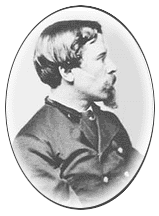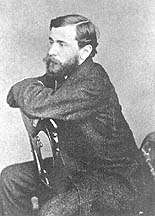Part II: The Civil War Years When Henry returned home to Boston, he spent the winter confined to his father's house on Chauncy Street with a sprained foot, patiently seeking employment opportunities as the outlook grew increasingly dismal. All the while tension steadily mounted between various groups of citizens, culminating in the firing upon Fort Sumter on April 12, 1861. Ten days later, Henry wrote about the outbreak of war in a letter to his brother Jim who still remained overseas in Europe: ...Everything excepting the war is forgotten, business is suspended, the streets are filled with people, drilling is seen on all sides and at all times. Our Massachusetts troops were poured into Boston within 12 to 24 hours after the command was issued from here, and were the first to go on and the first to shed blood....
Lieutenant of the 2nd Massachusetts Infantry, Company D On May 11,
1861 Henry Higginson was mustered in Colonel George H.
Gordon's 2nd Massachusetts Regiment, as second lieutenant
of Company D. Jim Savage already had been appointed
captain, and other friends of Henry's who had enlisted in
this regiment were: Greely Curtis (Captain of Company B),
Charles F. Morse (First Lieutenant), Henry S. Russell
(First Lieutenant), William D. Sedgwick (First
Lieutenant), Robert Gould
Shaw (Second
Lieutenant in Company F), Richard Cary (Captain of
Company G), and Stephen
Perkins (Second
Lieutenant). We were usually so tired that we could not recite, and we had really no time to study, but somehow or other we learned what we had to do. He [Lieutenant Colonel George L. Andrews] used to catechize us about all sorts of points, give instruction about the drill and about the control of the men, the feeding of the men, and many other smaller points. Men were taught to stand up when they were spoken to, to stand in the presence of officers, to wash themselves properly, and, in short, were disciplined. Presently, our drill became so attractive that people used to come and see us, and the parades which were given every evening were visited by a large concourse of people—friends and neighbors. On July 8 Higginson was commissioned first lieutenant, and on that same day the regiment headed to Boston. From Boston the 2nd Massachusetts moved on to New York and finally reached their destination of Hagerstown, Maryland. Three days later, the troops crossed the Potomac and started for Winchester, Virginia to face General Joseph E. Johnston's men. However, on the event of the Battle of First Manassas (Bull Run) on the 21st, the 2nd Massachusetts was ordered to hold the nearby town of Harpers Ferry. Though the Union army suffered a great defeat at Manassas, Lieutenant Higginson philosophically believed that the eventual outcome would be good for the men. Idealistic as he was about the nature of humankind, Higginson had been disappointed in the behavior of some of the soldiers in the ranks. He wrote after the battle: That night I was on guard. As I had not been to sleep the night before, the task was not easy. I sat on a fence-rail, and whenever I began to fall, I waked up. I walked up and down and did everything to keep myself alive, and certainly went to sleep part of the time while I was walking.... Seventeen regiments of three-months men have crossed the river for home, and we are thankful for it. Such a set of untamed and undisciplined wild-cats you never saw. They steal, they get drunk. We have four companies in the town guarding the houses and stores against these robbers.... Talk to the men as we will, they will not take care of themselves. Jim [Savage] is under the weather just now and will have to be off duty a day or two. [Bill] Sedgwick stands it well so far. Stephen [Perkins] has been starving considerably, as indeed we all have.... I am well and strong and shall bear more work than most of the men. The want of good officers is surprising.... I am glad of the defeat at Bull Run, and believe it will be productive of good to us. The Battle of Ball's Bluff On October
21, 1861, the 2nd Massachusetts was spared the defeat the
Union army faced at the Battle of Ball's Bluff, but
Higginson and his comrades witnessed the aftermath of
this disaster for their friends of 20th Massachusetts
Infantry, better known as the "Harvard
Regiment." One evening, just after drill, we were ordered to march. We heard that there had been a severe fight on the river, and we were to go as fast as we could. We marched all night, going right through a considerable stream, and presently it began to rain, and toward morning, as we were pegging along, we came across various men coming back, who said that we had had a terrible beating. This was the battle of Ball's Bluff. We reached the bank of the river, and there were various men in the houses thereabouts, and troops lying pretty near to the point we reached; and we then learned how our men had gone across the river, had been attacked and driven back, and how much harm had been done. All this time it was raining as hard as it well could, and we were wet through. I heard that a canal boat was going down the river, and that various men whom I knew were on board. I ran down and found Caspar Crowninshield on the stern of the canal boat in a pair of drawers and an overcoat. He gave me a hand, and I got up on the boat, heard his story, saw Willy Putnam [cousin of Charles Lowell] and various others lying down below. Willy Putnam had been shot in the stomach and could hardly speak, and there were various other men badly wounded. William Lowell Putnam died of his wound, but fortunately others who also were wounded—Putnam's cousin Lieutenant James Jackson Lowell (younger brother of Charles Lowell), and their friend Lieutenant Oliver Wendell Holmes, Jr.—survived. Captain of the 1st Massachusetts Cavalry, Company A With Putnam's death, Higginson experienced his first great loss in the war. William had been a friend—he and Henry had traveled abroad in Europe in happier times. Now the reality of war set in, and the trials of daily life weighed heavily upon Henry. As a result of his dissatisfaction with various aspects of the 2nd Massachusetts Infantry, Higginson requested a transfer. On October 31, 1861 he and Greely Curtis received commissions in the 1st Massachusetts Cavalry as a captain and major, respectively. They resigned from the infantry and departed for Boston to enlist with the new regiment that was to be mustered in. But Higginson would not become an active member of the unit any time soon, much to his disappointment. Having contracted typhoid fever, Higginson was not able to join his new comrades in camp at Readville until December. When he arrived in camp, as senior captain he was responsible for the care and discipline of the men in Company A: They were a remarkably tough set of men of all sorts of occupations, among them prize-fighters, barkeepers and the like, and also some very good men. They had had as their first captain a barkeeper, who could do nothing with them, and he was dismissed and I was put in charge.... I had to ride and look after my men, do the regular guard-duty, drill, etc., and I knew nothing about it and had to learn as I went. On Christmas Day, the First Battalion (comprised of Companies A, B, C, and D) under Major Curtis departed for Annapolis, Maryland, expecting to join General Ambrose Burnside's expedition to North Carolina. After drilling here for a few weeks, however, they were instead ordered to join the troops under the command of General David Hunter on Beaufort Island off the coast of South Carolina. While stationed on the island, Higginson wrote to his father in March 1862 about life as a cavalryman and caring for the regiment's horses: I was ignorant as a baby of horses when I joined the regiment at Readville, and yet I knew that I must take great care of my company horses as my means of making my men efficient. Now I know very little of horses, but I have succeeded in making my men work at them in every way until they look tolerably well.... I find great and continual pleasure in this occupation, and foresee the same for a long time. Infantry drill once learned is monotonous, but riding is a lasting excitement and delight. Promotion to Major of the 1st Massachusetts Cavalry Higginson was commissioned major on March 26, 1862, a deserved promotion that he did not expect. In a cheerful letter to his sister Mary ("Molly"), he described camp life with his horses, and—with tongue-in-cheek—wrote about his new status as major: Beaufort, S.C., May 20, 1862. Dear little Molly: — What
do you want to know about our camp? One camp is very like
another, the difference being that with us cavalry folks
a long rope is stretched down the company street, to
which the horses are tied. We keep very tidy and clean,
strike (that is take down) the tents three times a week,
send the men to bathe as often, take all the bedding,
etc., out of the tents every fair day, and in short do
everything we can to keep healthy....
Henry's Civil War story continues: Page 1 | Page 2 | Page 3 | Page 4
Index to Higginson's Pages
Copyright © 2001 - 2009 1st Dragoon's Civil War Site. All rights reserved. |
||||||||


